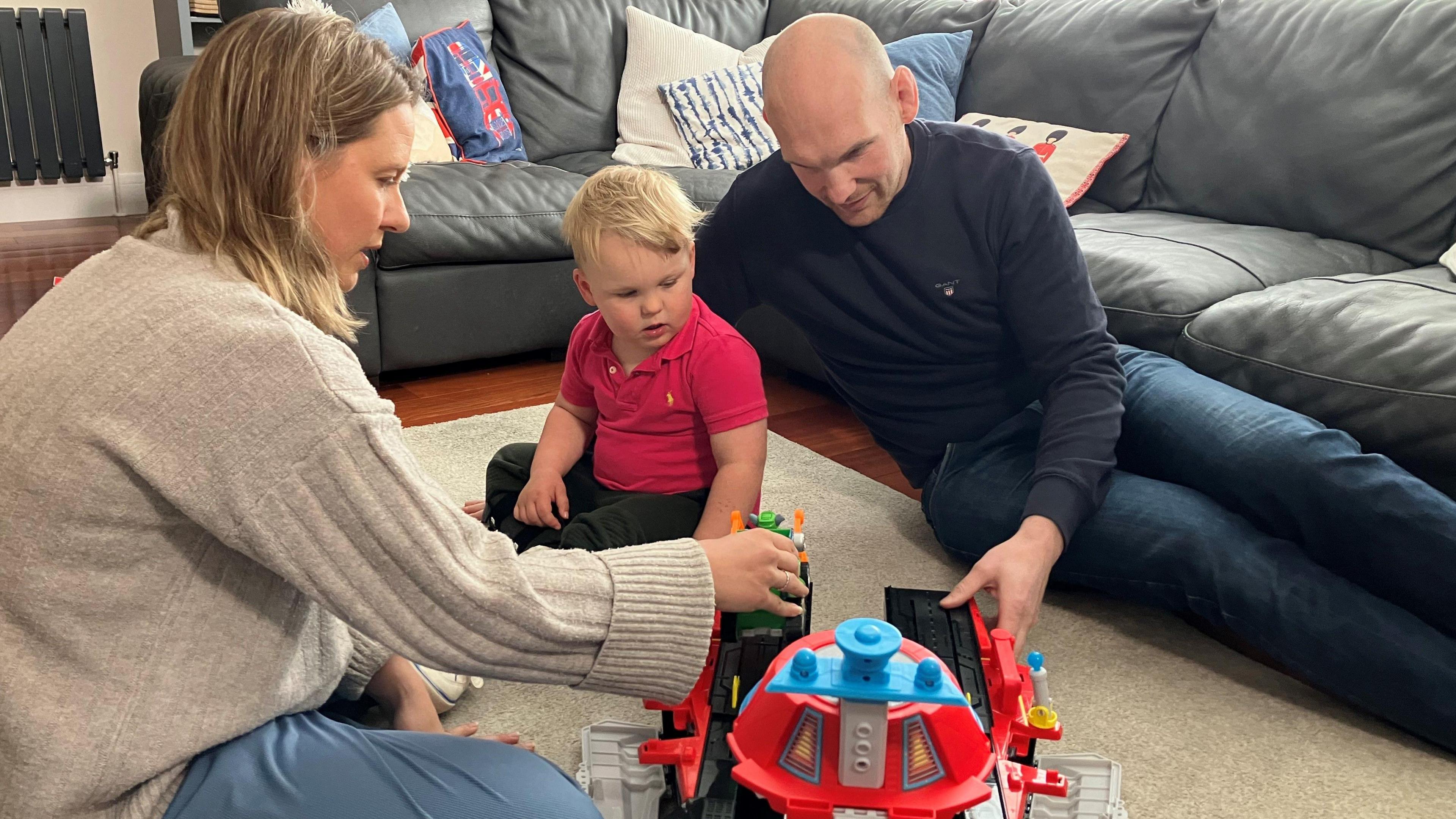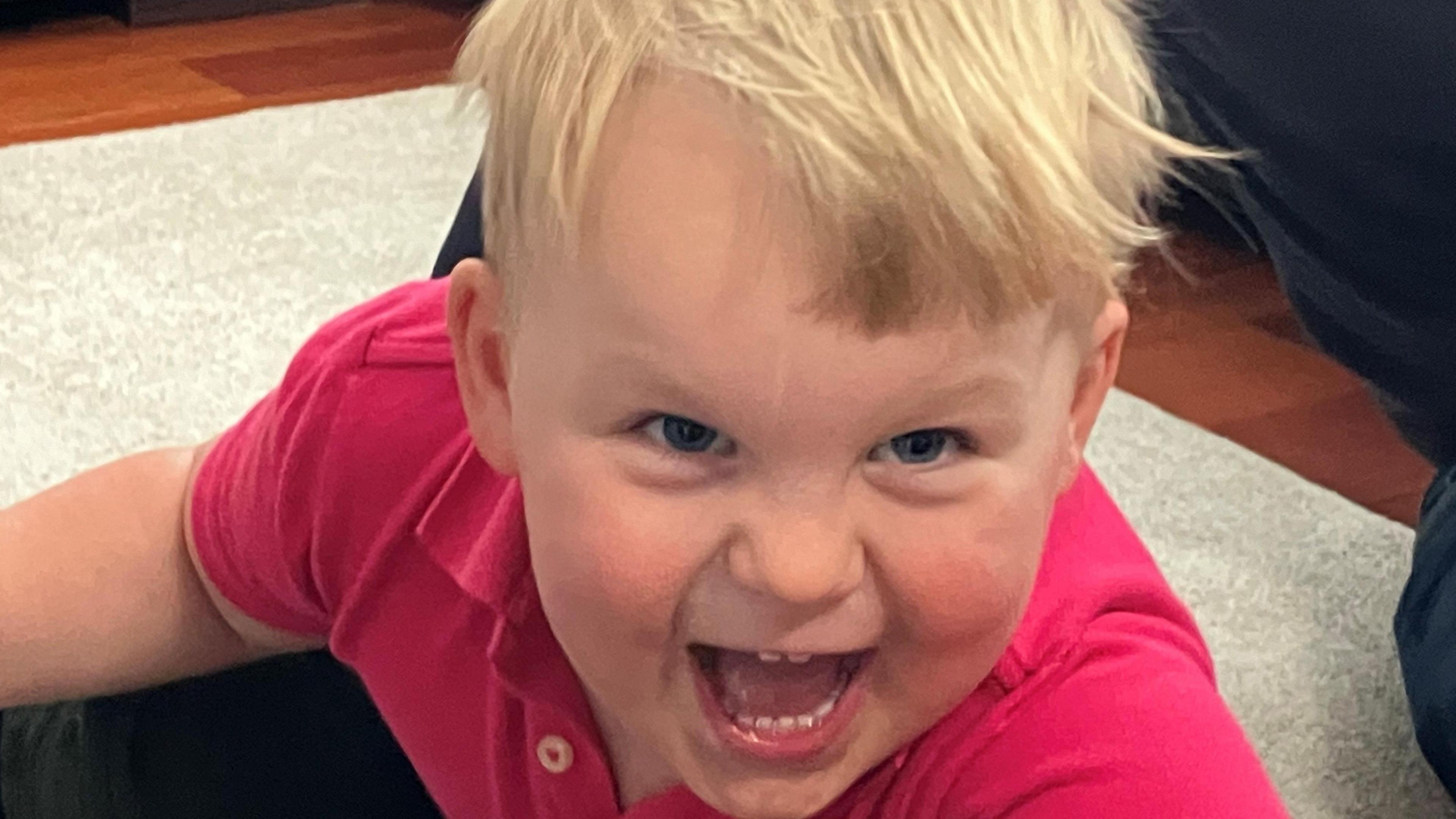Your Voice, Your Vote: Rehabilitating Reuben, 3, after stroke

Reuben appears to have had a rare reaction to chicken pox which caused his paralysis
- Published
In the run-up to the general election, the BBC is looking at the issues that matter the most to you, as part of Your Voice, Your Vote.
In Worcestershire, the family of a three-year-old stroke victim say they have been left in limbo by rehabilitation services.
Reuben was left paralysed on his right side after the stroke last month, but his parents are questioning how long treatment takes and want to see more funding for physiotherapy services.
His parents are among the many people who got in touch with the BBC via Your Voice, Your Vote to tell us that money for the NHS is one of the most important issues for them in this election.
Reuben, from Bromsgrove, appears to have had a rare reaction to chickenpox which caused his paralysis, his family said, and is waiting for vital community physiotherapy to aid his recovery.
His parents said that it took eight hours for his stroke to be identified by the NHS and for Worcestershire Royal Hospital to give him the clot-busting aspirin that would restore oxygen to his brain.
The stroke left him paralysed on his right side and his parents were told it was likely that he would never walk again, but six weeks later he has taken his first steps.

His father, Liam, said they now want Reuben to make the best recovery possible, but they were told that he would have to wait for a year for community rehabilitation by staff at Birmingham Children’s Hospital.
After raising the issue on social media sites and starting a Go Fund Me page, they have since been informed by Worcestershire Community Healthcare that it will now be weeks rather than months or years, but Liam says they have not been told when.
“Children should have a bare minimum of an hour a day, but the physios are stretched and they need more funding and more of them to give a better service because they want to give the best service that they can.
"But they are giving it with one hand tied behind their backs,” he said.
His wife, Holly, added that Reuben is taking up a bed at Birmingham Children’s Hospital so they can maintain the in-patient physiotherapy because they cannot get it in the community.
They are also aware that if he gets fast-tracked for physio in weeks, other children will not get it.
“If Reuben is being bumped up the list, then another child is going to be bumped down the list and if people are waiting a year before they can get any physio, that is just crazy," she said.
The Chartered Society of Physiotherapists claim that rehabilitation services have borne the brunt of years of under investment.
Director of practice, Ash James, said it can have a great impact on the recovery that patients can achieve.

Staff are working to treat people "with one hand tied behind their backs", Reuben's father said
“All of this is further compounded by a physiotherapy workforce shortage across the UK, where we know we need a 7% increase in NHS physiotherapy positions every year to meet rising demand.
"We’re at a point in time where we need to flip the script and recognise that rehabilitation is as important as medicine and surgery, because that is the case for an ever-growing number of people.”
Herefordshire and Worcestershire Health and Care NHS Trust said that the family was advised of a general time-frame for assessment by hospital staff which didn’t take account of the way that they prioritise patients.
Those who present with more urgent or pressing needs are “typically being seen on an immediate, urgent or priority basis in line with NHS guidelines.
“We are working collaboratively with our acute and Integrated Care Board colleagues to plan the patient’s on going care.
"We recognise the distress and worry at the time discharge from hospital was being considered and hope those concerns have been alleviated.”
Candidates respond
The question of rehabilitation therapy shortages was put to politicians in Bromsgrove, Reuben's parents' constituency.
Bradley Anthony-Thomas, Conservative, said that he wanted to see reform of public services which his party would deliver.
“To ensure that every single person, man, woman, old, young who requires health care can get it at the fastest possible point of delivery to meet their needs.”
Labour’s Neena Gill said dealing with the NHS was her party's top priority.
“It is important that we have quick access to consultants, quicker assessments and we invest in other services like physiotherapy," she said.
Liberal Democrat candidate, neurologist Dr David Nicholl, said he was passionate about rehabilitation.
“We must do better. There has been a lack of investment in rehabilitation which is so important to get people out into the community.
"I think that he is an emblem of the problems we have in the health service.”
Reform UK’s candidate is Glen Brampton. He said the party would put patients in charge with an NHS voucher scheme.
”Patients will receive a voucher for private treatment if they can’t obtain treatment in a timely manner," he said.
Independent Sam Ammar said it was about localness: “If you are having difficulty, you really need a strong constituency MP to stand by your side and defend your rights."
The Green candidate is Tallia Ellis and she said the Green party manifesto had set out bold plans to invest in the NHS.
"This includes physiotherapy which is an essential part of helping people recover from illness,” she said.
Aheesha Zahir from the Workers Party of Britain said that as a mother, she was going to fight tirelessly to ensure therapy waiting lists come down whilst restoring local facilities like the Princess of Wales Hospital.

Follow BBC Hereford & Worcester on Facebook, external, X, external and Instagram, external. Send your story ideas to: newsonline.westmidlands@bbc.co.uk, external
What really matters to you in this general election? What is the one issue that will influence your vote? Click the button below to submit your idea, and it could be featured on the BBC.